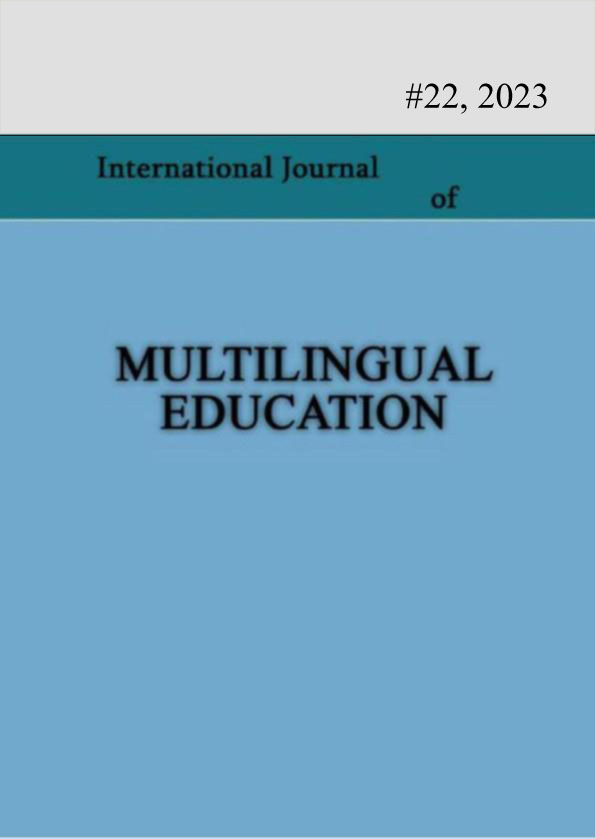Translanguaging as a Tool for Correcting EFL Learners’ Errors in Writing
Keywords:
Translanguaging, Errors, Writing discourse, EFL, Georgian learners.Abstract
This paper explores Georgian students’ errors influenced by their L1 and their perceptions on integrating translanguaging into error correction in the writing task. Implementing translanguaging (simultaneous use of Georgian and English languages as a unitary meaningmaking system) as a tool of correcting Georgian students’ errors in writing seems to be the novelty of our research. The given case study deals with 21 Georgian students, aged 16-17, learning English as a foreign language. Both, qualitative (online questionnaire for students) and quantitative methods were used. Students’ general errors were classified accordingly: grammar (e.g., tense and aspect (17), agreement (15), number (24), infinitive and gerund (5), article (19)) (Overall – 80); Vocabulary (missing word, extra word, wrong word) (Overall –49); Spelling (Overall – 54); Punctuation (Overall – 31); Out of which errors stipulated by L1were distinguished. The survey found that the most students (≈ 52%) supported replacing the monolingually-focused way of giving feedback on writing tasks. However, some students (≈ 33%) were skeptical of the translanguaging approach and found it unexpected and unnecessary. The study suggests that implementing translanguaging as a tool of correcting students’ errors, i.e., emphasizing the role of L1 can enhance learners’ understanding of grammar and vocabulary in both languages.
References
Al-khresheh, M. (2010). Interlingual Interference in the English Language Word Order Structure of Jordanian EFL Learners. European Journal of Social Sciences. Volume 16. 105-116.
Barbour, C., & Lickorish, K. Q. (2020). Los pájaros are feliz and are dreaming about gwiazdy: Facilitating translingual creative writing in the primary classroom. English in Education, 54(1), 6–26.
Black, P., & Wiliam, D. (1998). Inside the Black Box: Raising Standards through Classroom Assessment. Phi Delta Kappan, 80, 139-148.
Canagarajah, S. (2011). Translanguaging in the classroom: Emerging issues for research and pedagogy. Applied Linguistics Review, 2(1), 1–28.
Canagarajah, S. (2013). Translingual practice: Global Englishes and cosmopolitan relations. Routledge Edge, J. (1989) Mistakes and Correction. London: Longman.
Ellis, R. (1997). Second Language Acquisition. Oxford: Oxford University Press.
García, O., Flores, N. & Spotti, M. (eds.) (2017). Handbook of Language and Society. New York and Oxford: Oxford University Press.
García, O., & Li, W. (2014). Transalnguaging: Language, bilingualism and education. University of London.
Harmer, J. (2007). The Practice of English Language Teaching. Harlow: Longman.
Li, W. (2018). Translanguaging as a practical theory of language. Applied Linguistics, 39(1), 9–30. Li, W., & Shen, Q. (2021). Translanguaging: Origins, developments, and future directions. Journal of Foreign Languages, 44(4), 2–14
Nunan, D. (2001). Second language teaching and learning. Beijing: Foreign Language Teaching and Research Press.
Turnbull, B. (2019). Translanguaging in the planning of academic and creative writing: A case of adult Japanese EFL learners. Bilingual Research Journal, 42(2), 1–20.
Sano, A. (2018). The efects of translanguaging in discussion as a prewriting activity for writing in a second language. ARELE: Annual Review of English Language Education in Japan, 29, 193– 208.
Subandowo, D. (2017). The Language Interference in English Speaking Skill for EFL Learners. 10.2991/iselt-17.2017.36.
Velasco, P., & García, O. (2014). Translanguaging and the writing of bilingual learners. Bilingual Research Journal, 37(1), 6–23.
Downloads
Published
How to Cite
Issue
Section
License
Copyright (c) 2023 Khatuna Buskivadze; Zurab Baratashvili

This work is licensed under a Creative Commons Attribution-NonCommercial 4.0 International License.
Copyright (c) - Authors who publish with this journal agree to the following terms: Authors retain copyright and grant the journal the right of first publication with the work simultaneously licensed under a Creative Commons Attribution-Noncommercial 4.0 International License, which allows others to share the work with an acknowledgement of the work's authorship and initial publication in this journal. Authors are permitted and encouraged to post their work online (e.g., in institutional repositories or on their personal website) prior to and during the submission process, as it can lead to productive exchanges, as well as earlier and greater citation of published work (see The Effect of Open Access). Authors may enter into separate, additional contractual arrangements for the non-exclusive distribution of the journal's published version of the work (e.g., post it to a repository or publish it in a book), with an acknowledgement of its initial publication in this journal.

